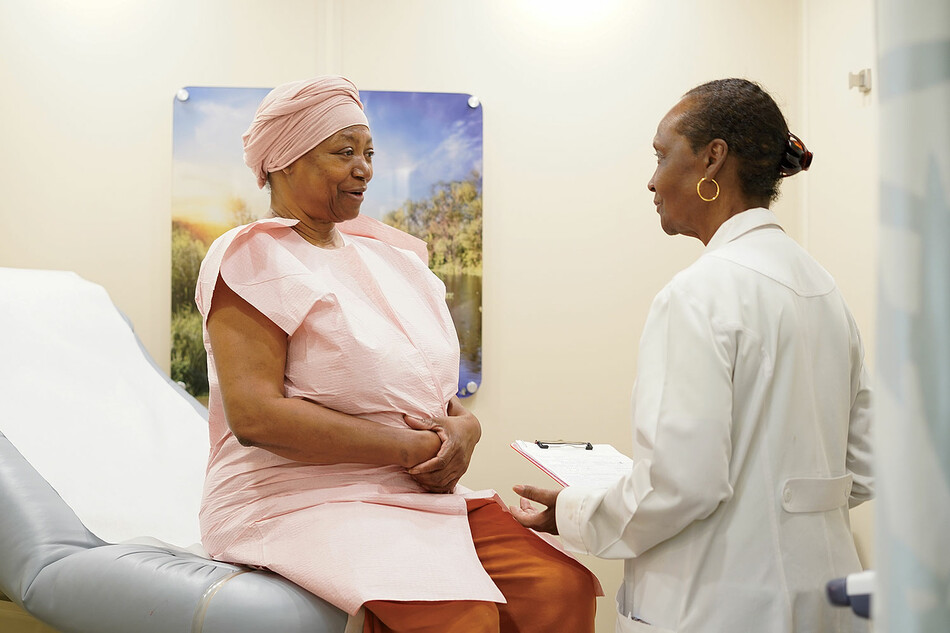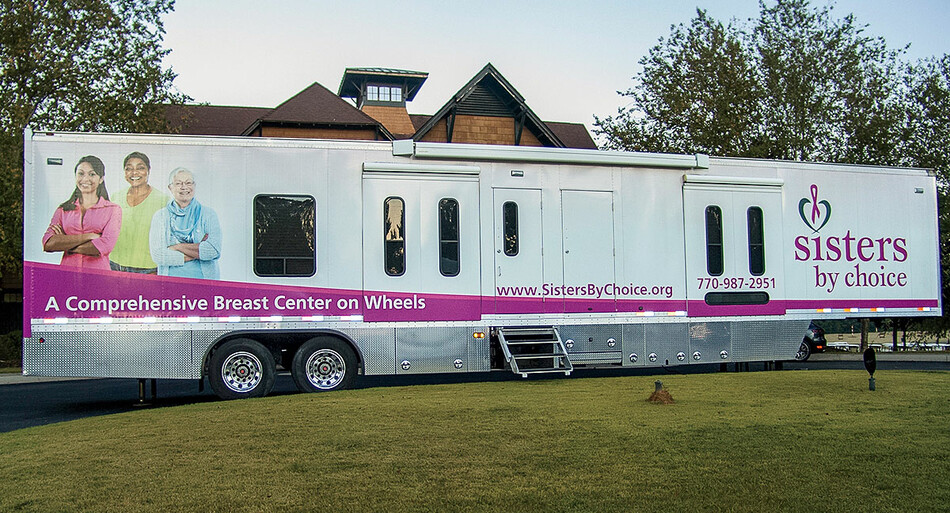In her forty-plus years as a breast-cancer surgeon, Rogsbert Phillips-Reed ’77VPS has always been troubled by how little most people know about the disease. “No matter what walks of life women come from, the level of knowledge about breast cancer is frequently just not there,” she says. Despite advances in research — some of which she’s contributed to through clinical trials — it frustrates her that so many people still die of breast cancer. “A lot of women don’t come forward when they feel a lump,” Phillips-Reed says, “because there’s a significant amount of fear surrounding treatment.”
Throughout her career, the Atlanta-based physician has been on a mission to ease those fears and improve patients’ health both through Metro Surgical Associates, her private practice, and Sisters by Choice (SBC), a nonprofit promoting breast-cancer awareness and education. SBC also operates a mobile breast clinic that provides screenings for underserved people across the region.
Often parked beside community landmarks like schools, churches, and grocery stores, the roaming four-room facility — a converted eighteen-wheeler — is the first of its kind in Georgia. SBC’s clinic exclusively serves uninsured patients in a state that ranks forty-eighth in percentage of residents with health insurance. Breast exams and mammograms are available on-site by appointment, and patients requiring further evaluation are referred to partner hospitals. If treatment is needed, the organization guides patients toward financial-assistance programs. “I’m committed to following up with these patients. We make sure our mobile unit runs just like a doctor’s office,” says Phillips-Reed.
Before the pandemic, SBC’s mobile clinic served a thousand patients per year. Phillips-Reed is working to add staff to accommodate that volume while expanding the service’s geographic range. In October, the clinic traveled outside metro Atlanta for the first time: over a hundred miles southwest to Clay County, where more than a quarter of the sparse population lives below the poverty line and only one doctor, Karen Kinsell ’93PH, ’93VPS, serves the entire region. Eventually, Phillips-Reed hopes to acquire a second vehicle, visit more counties, and team up with more funders and medical providers to support rural cancer patients in coming to Atlanta for treatment.
“In Atlanta, we have a lot of resources — it’s really about letting people know what the resources are,” she says. In small counties like Clay, where the nearest hospital or mammogram machine is more than an hour’s drive away, “We can make a major difference because they’re starting from ground zero.”
To spread awareness of the importance of breast-cancer screening and new approaches to treatment, SBC has held an annual conference since 1990. It also runs a network of support groups, as well as a yearly survivors’ celebration and a 5K fundraiser. The name Sisters by Choice, notes Phillips-Reed, was suggested by her patients: “They did not choose to get breast cancer, but they came together to fight breast cancer.”
SBC funds its activities through donations from individuals, local businesses, and civic organizations. Apart from one administrative employee and the mobile clinic’s paid nurses and mammogram technicians, it relies on the efforts of volunteers. “I feel fortunate because the community has embraced Sisters by Choice,” says Phillips-Reed. “We are small, but we can do what we do simply because of all the support that we get.”
Phillips-Reed’s career is all the more remarkable considering she almost didn’t become a doctor. While earning a master’s in chemistry, she took her adviser’s suggestion to apply to medical school, but by the time she heard back, she’d settled into a research job. “I sat down to write a letter to Columbia saying thank you but no thank you,” she recalls.
Something stopped her. “I could not write that letter,” she says. “It was an opportunity for an African-American woman to go to an Ivy League school. It was an opportunity I could not give up. It turned out it was probably one of the best decisions that I made.” After getting her MD from Columbia, Phillips-Reed returned to Atlanta to become the second woman — and the first Black woman — to graduate from Emory University’s surgery program.
Now, after decades in the field, Phillips-Reed isn’t slowing down. She rises most mornings at 4:30 and performs surgeries three days a week at Metro Surgical Associates, which has offices in downtown Atlanta and the nearby city of Lithonia. “It’s really a busy practice,” she says. “I keep telling people I’ve got to develop my exit plan, and my patients are saying, ‘You can’t retire.’”
Over the years, Phillips-Reed has decompressed with tennis (until her knees rebelled), golf (a shared pastime with her husband before his death in 2020), and visits with her granddaughter. What really keeps her going, though, is using her skills as a surgeon. “I love being in the operating room,” she says, “because right there, it’s definitive — I know that what I do is a major part of how that patient is going to do down the line.”
This article appears in the Winter 2024-25 print edition of Columbia Magazine with the title "Driving Better Outcomes for Breast-Cancer Patients."




